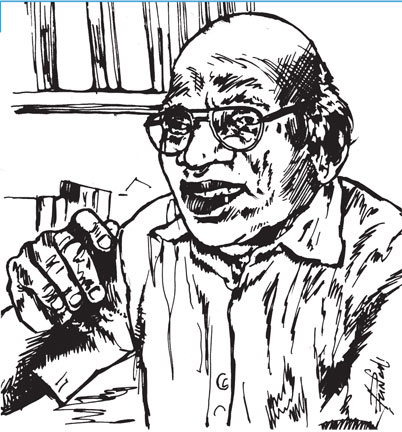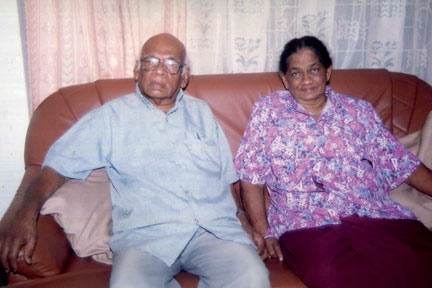|
 K. Jayatilake – the sage of Kannimahara: K. Jayatilake – the sage of Kannimahara:
Deep philosophy in simple and unambiguous narrative
By Indeewara Thilakarathne and Ranga Chandrarathne
“Some of the peripheral objectives of
literature are promoting morals, propagating political ideologies and
escapism. We could see when examine deeply, those have been created to
fulfil momentary needs of the society. For instance, objectives of
contemporary Russian and Chinese literature seem to reinforce their
political ideology. Even in Sinhalese literature, it seems that many
write books with the objective of challenging the conventions. They
believe that the progress of Sinhalese literature has been hampered by
these traditions and conventions. According to them, the conventions in
both society and in literature should be challenged."
This brief note is on the passing away of versatile writer and
thinker K.Jayatilake at the age of 85. He was born on July 27 , 1926 in
Kannimahara and received his education from the government’s Boys’
school in Radawana.
During his illustrious literary career spanning over half a century,
he received numerous accolades including Doctor of Letters from the
University of Sri Jayewardenepura. His rich corpus of literary works
includes 16 novels, eight collections of short stories, nine books on
literary criticism.
Writer and thinker
Apart from his literary legacy, Kaluarachchigamage Jayatilake or
K.Jayatilake was a thinker. It is this remarkable combination which
lends much-needed depth to his literary works and characters he created
through his novels such as Charita Thunak and Apprasanna Katavak.
“The combination of a philosopher, thinker and writer is a rare
attribute for a person. Kaluarachchige Jyatilake or K.Jayatilake is such
a person. ”, writes Kathleen Jayawardene. Jayatilake himself wrote about
thinker or philosopher in writer. He says that a writer should be a
thinker and it is impossible for one to become a writer.
“An important task of a novelist is to examine what valuable goods
that the mankind has left along the journey of progress. You cannot
shirk this responsibility delegating it entirely to the philosopher. For
it is he (the writer) who could present it lively ”-K.Jayatilke, Sahitya
Vichara Chintavaliya.
 |
|
K.Jayatilake with his
wife Sumana Jayatilake |
Jayatilake’s philosophical ideas were presented, for the first time,
when he wrote the essay ‘Sannishad’ to Vyanga which he wrote together
with Mahagamasekara in 1960. Subsequently these ideas in the same
narrative style as that of Sannishad were presented in booklets Kudugoth
Rachana, Atpasuru, Sankalpana and Niri bath. Although many identified
them as either prose or poetry, Jayatilake says that they are not
poetry. What is significant in these writings is that they can be
subject to multiple readings and therefore, generates plurality of
meanings entirety of which some readers may not grasp. But from any
perspective, these writings would lead readers to a deeper
understandings on the ideas enunciated in them.
On literary criticism
K.Jayatilaka’s ideas on literary criticism which he presented in
several books such as Sahitya Vichara Chintavaliya are still relevant.
His diary commenced in 1966. In his diary entries Dinapothen (From the
diary), he wrote,
“There is a view that in literary criticism, the author’s ideology
should not be questioned. In my opinion, the principal task of the
literary critic is to criticise the writer’s ideology. The most
important aspect of a novel or a literary work is the ideology. What
else can the critic do other than criticising the ideology of the work?
To speak about language, characterisation and plot? …. These are
important for a writer to keep the reader interested in them. If they
are not (language, characterisation and plot) weak, whatever the critic
might say about the work, readers will not read it.”
“Some of the peripheral objectives of literature are promoting
morals, propagate political ideologies and escapism. We could see when
we examine deeply, those have been created to fulfil momentary needs of
the society. For instance, the objectives of contemporary Russian and
Chinese literature seem to reinforce their political ideology. Even in
Sinhalese literature, it seems that many write books with the objective
of challenging the conventions. They believe that the progress of
Sinhalese literature has been hampered by these traditions and
conventions. According to them, the conventions in both society and in
literature should be challenged.
It is true that conventions should be changed. But when conventions
are done away with, it poses a threat to the very existence of society.
When conventions are challenged without any specific objectives, it
could shatter societal ties leading to a kind of ‘anarchy’.
Comprehending this, the writer would gradually infuse ideas on morality
into the literature. This is valid for literary traditions.
It is because of this, that some have to go back to folk poetry with
metre when they are confused with blank verse. These crises, from time
to time, are only ripples of water in the river of literature. Never
will they become the mainstream.
When troubles come in life, some try to find avenues of escape in
literature. Those who like to read about fantasy worlds in which you may
have everything imaginable and people are uneducated and hardworking
labourers. They derive satisfaction from reading such fictions.
Accordingly, it is obvious that breaking the moral code or convention
is not la ofty objective of literature. Using literature to break the
traditions when they become impediments to man’s progress is only a
fulfilment of temporary needs. …literary work would be very popular when
it fulfils momentary needs. But it will leave out of its role like an
old soldier. But, a classical work of literature, may not gain momentary
popularity, would get its due recognition. Most of the times, literary
works achieve it prominence because of their noble attributes. If a
literary work is able to retain that popularity, it is certainly,
because of its noble attributes.
Prof. Sarachchandra emphases this fact in Kalpana Lokaya, ‘ Those who
appreciated literary works of Shakespeare, Kalidasa and Tolstoy have ,
certainly, outnumbered those who disliked them. But, there are no facts
to suggest that at the time those literary works were written, they were
being hailed universally as great works of literature. …at the time,
there were only a few who understood the zest of them’ –K.Jayatilaka
As man needs food for physical existence, he also needs food for
spiritual sustenance. They are human needs. Literature is such a
spiritual food. ”
K. Jayatilaka library
The K. Jayatilaka library and the K.Jayatilaka Foundation in Radawana
are born out of the philosophy of the writer. K.Jayatilake’s ancestral
house which was built by his father K.J Arnolis Appuhamy in 1921 has
been converted into a library named after K.Jayatilaka. It was in that
house Jayatilake was born in 1926. Apart from the library and the
K.Jayatilake Foundation, the serene atmosphere provided the backdrop for
the rich canons of literary works by the writer. Contemporary Sinhalese
novelist Kathleen Jayewardene states, “Madduma Podinona, K.Jayatilake’s
mother knew folk tales and folk poems and she used to tell them as
bedtime stories. Jayatilaka says that his mother never told the same
story twice. He believes that these folk tales have inspired him to
become a writer”.
One of the important facts that would have contributed to make K.
Jayatilaka a thinker and great writer is that he was a bilingual who
read widely in English. His substantial knowledge of philosophies both
Western and Eastern is amply manifested in Darshanavada Asabadin (Edge
of philosophies). It is pertinent to end this brief note on him with a
quotation from Atpasura.
Child and the old man
‘Where was that innocent child in your place?’
‘Don’t be afraid
He will come again
When I become old’
|

